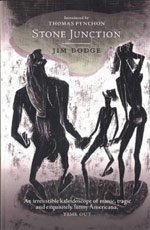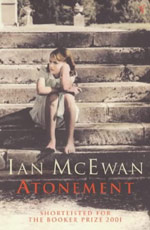Dodging Ian McEwan
| |

| I don't know about you, but I always find it a struggle packing books for my holiday. I know that there's absolutely no point in putting in those big academic tomes that are lying around in my study, nor anything too experimental; and that poetry often doesn't work - though in theory its short bursts might suit the sunny moments I choose to read in. So I often end up taking more mainstream books than I might ordinarily read, or at the least more straightforwardly narrative volumes than normal. Even so, it's surprising how books end up surprising you. I'm no revisionist or apologist for the Holocaust, for instance, but I don't choose to read about the subject. But last year in Italy Anne Michaels' Fugitive Pieces turned out to be - on one level a least - a novel about the Holocaust, though of course it was also about alienation, despair, love, and notion of place & home. This year two of the books I took to Italy really surprised me. Jim Dodge's Stone Junction, a 1990 novel recently reissued in Britain by Canongate, is a rollercoaster ride of a story that pretends to be various things throughout its 400-plus pages. 'Pretends to be?' I hear you say. Well, yes. The book can be read as a travelogue, a conspiracy theory, a detective story, or a 'coming-of-age' story. It could also be dismissed as hippyshit; or taken as a postmodern masterpiece. You might be sold the book, or totally put off, by the fact that Thomas Pynchon has written an introduction to the book. Personally, like most introductions, I find it irrelevant. Anyway, what happens? Well, Daniel and his Mum get mixed up with some political activists and a bomb plot. Daniel's mother gets killed ['Who is the killer?' is the detective part of the tale], Daniel gets injured as well as orphaned, and the elusive and mysterious AMO [the Alliance of Magicians and Outlaws] decide to take responsibility for Daniel, and also train him in their ways. This 'training' takes up most of the book, and involves Daniel being taken under the wing of an assortment of demented Zen anarchist weapons experts, survivalists, magicians, drugs dealers, gamblers and burglars, who slowly give him the means and state of mind to find out who actually killed his mother. On one level the book is a series of set pieces, novellas almost, as each trainer lives somewhere new and has a different training regime and reason for being an AMO member, but somehow Dodge's book is bigger than the sum of its parts, and it all hangs together terribly well, even though it shouldn't. It's both unbelievable but totally convincing; it's improbable but also 'real' enough to have you looking over your shoulder; it's also very very funny. Personally I found the ending - which I'm not going to give away - a bit pretentious and a let down, but it's unexpected and strange enough that the reader in no way sees it coming. |

| It was quite a jump from Dodge's fluid and slightly deranged prose to Ian McEwan's Atonement. Not only is the novel set back in the 1920s but McEwan's prose is terribly English: formal, expansive and descriptive without moving the story along. It felt bloated and old-fashioned after Dodge's more 'natural' and casual style. It' also consists of 'set pieces', moving from the family house, through to Dunkirk [war is another theme I don't tend to read; I felt tricked here into reading a war book] and then into London later in the war. The tone is knowing and smug, at various points the author puts words into his characters' mouths - particularly the teenage writer who becomes an adult author - to defend what he is doing stylistically and plotwise, and there is a dreadfully clumsy sleight-of-hand at the end where it is revealed that the whole book has been written by the writer in the book, and there is no happy ending after all. The whole book revolves around this, and the thin idea of writing as an atonement for wrongs committed earlier [in this case a malicious teenager wrongly accusing her sister's lover of rape, resulting in both jail and loss of prospects]. I was mostly reminded of EM Forster and of Lawrence Durrell's The Alexandria Quartet. In itself no bad thing, of course, but these authors were writing decades ago, and the novel has moved on. McEwan started as an exciting and original writer of taut, slightly malevolent, dark short stories. Here he has slipped into a parody of a bygone literature. Despite the knowing comments secreted throughout the book, it's all dreadfully coy and tame; the comments don't justify the whole, even if one wanted to read it as a pastiche or stylistic exercise, which in many ways it is. Why this ever got shortlisted for the 2001 Booker is, of course, another question! Meanwhile, back in Tuscany, I pushed Atonement aside with some relief and started in on Arthur at the Crossing Places, the second volume of Kevin Crossley-Holland's new King Arthur trilogy, which is a startlingly original take on, and retelling of, the enduring stories of the Round Table. Very strange, to be sitting in the heat, reading about knights in armour clanking around in the middle ages. It certainly shows up Ian Mcewan's book for the lightweight stuff it is, and surprisingly - with its double layer of storytelling [realistic village life in the middle ages + the visions of King Arthur's knights seen by the story's main character in his scrying stone] and rich language - has a lot in common with our American friend Jim Dodge. © Rupert Loydell 2002 |